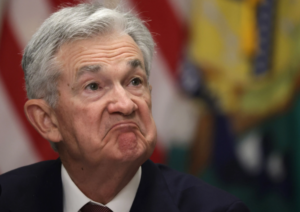$SPY $FXI $DXY
#China #Tariffs #TradeWar #Economy #USMarkets #Stocks #Investing #FederalReserve #SupplyChain #GlobalTrade #Geopolitics #Inflation
China has declared its firm stance against the United States amid escalating trade tensions, signaling a commitment to continue the economic confrontation. On Tuesday, Beijing announced the imposition of additional tariffs reaching as high as 15% on specific American goods, which will take effect on March 10. The measures come alongside new export restrictions targeting designated U.S. entities. This move represents a direct response to ongoing tariff hikes and trade restrictions imposed by Washington, marking yet another significant escalation in economic hostilities between the world’s two largest economies. Investors are closely monitoring the situation as it generates uncertainty across global markets, particularly in sectors dependent on U.S.-China trade relations. The heightened tensions could have ripple effects on both equities and currency markets, influencing investment decisions and economic sentiment.
The escalation is expected to create volatility across financial markets, particularly in the commodities and technology sectors, which are heavily integrated into the U.S.-China supply chain. Companies reliant on Chinese imports for raw materials or components, as well as those with extensive operations in China, could face increased production costs and logistical challenges. Key industries, including semiconductor manufacturing, consumer electronics, and agriculture, may bear the brunt of these new policies. On Wall Street, major indices such as the S&P 500 ($SPY) and ETFs tracking Chinese equities ($FXI) may see increased fluctuations as investors assess the risks of prolonged economic confrontation. Meanwhile, the U.S. dollar index ($DXY) could strengthen as investors seek safer assets, potentially pressuring emerging market currencies and further complicating global financial stability.
Beyond immediate market reactions, prolonged economic warfare between the U.S. and China raises concerns about inflation and broader economic stability. As supply disruptions become more entrenched, businesses may pass higher costs onto consumers, further fueling inflationary pressures. This scenario places additional strain on the Federal Reserve, which has been navigating a delicate balance between controlling inflation and sustaining economic growth. If inflationary forces intensify due to supply chain disruptions, the Fed may be forced to maintain a more hawkish monetary policy, potentially leading to higher interest rates for an extended period. Such a trajectory would affect market liquidity and corporate borrowing, thereby influencing investment strategies across multiple asset classes.
From a geopolitical standpoint, the trade war could reshape longstanding trade alliances and accelerate deglobalization trends already in motion. Countries reliant on both U.S. and Chinese economies for exports and imports may seek alternative partnerships to mitigate risks associated with the escalating dispute. Companies might also diversify sourcing strategies to reduce dependency on any single region, though such adjustments take time and come with significant investment costs. In the short term, investors will be weighing the immediate financial impact of China’s retaliatory measures, while also considering the broader macroeconomic consequences of a deteriorating U.S.-China relationship. As both nations remain steadfast in their respective economic positions, the likelihood of a near-term resolution appears slim, keeping markets on edge and adding further uncertainty to an already turbulent global financial landscape.







Comments are closed.